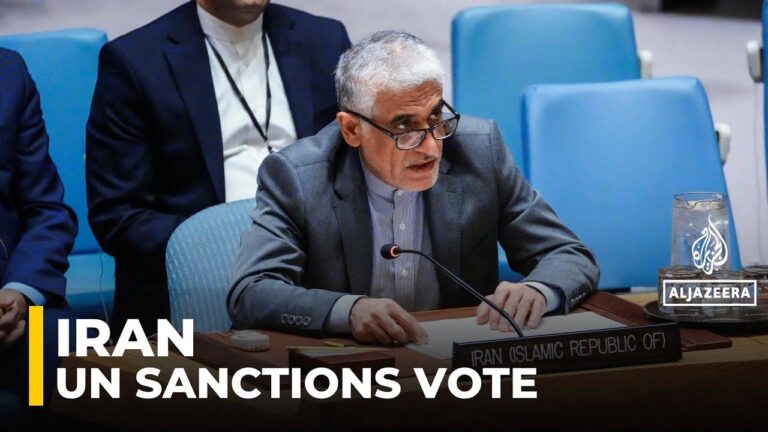France’s President Emmanuel Macron has announced that United Nations sanctions on Iran are expected to be reimposed, signaling a major escalation in international efforts to address concerns over Iran’s nuclear program. The development comes amid growing tensions between Tehran and Western powers, raising the stakes for diplomatic relations and regional stability. This move, reported by Reuters, marks a significant shift in the global approach to Iran’s compliance with its nuclear commitments and is set to impact geopolitical dynamics in the Middle East.
UN to Reinstate Sanctions on Iran in Response to Nuclear Concerns
In a decisive move aimed at addressing mounting international concerns over Iran’s nuclear program, the United Nations has announced plans to reinstate a series of sanctions. French President Emmanuel Macron emphasized the urgency of this action, highlighting that the restoration of these measures is a response to recent developments suggesting Tehran may be advancing its nuclear capabilities. The renewed sanctions are intended to pressure Iran into complying with existing agreements and to deter further escalation in the region.
The reinstated sanctions will target key sectors of Iran’s economy, with a particular focus on limiting access to nuclear-related materials and restricting financial transactions. According to official statements, the sanctions package includes:
- Trade embargoes on nuclear-related equipment and technology
- Freezing assets linked to Iran’s nuclear program
- Travel bans on individuals involved in nuclear development
These measures are expected to come into effect within weeks, pending formal approval by the UN Security Council. Experts predict that the sanctions could intensify diplomatic tensions but also serve as a critical leverage point in ongoing negotiations.
| Sanction Type | Targeted Area | Expected Impact |
|---|---|---|
| Trade Restrictions | Nuclear Equipment Imports | Reduce access to critical materials |
| Asset Freezes | Financial Networks | Limit funding for nuclear projects |
| Travel Bans | Key Officials | Impair coordination and outreach |
Macron Emphasizes Need for Unified International Approach
French President Emmanuel Macron underscored the critical importance of solidarity among global powers in reimposing sanctions on Iran. Highlighting the geopolitical stakes, Macron stressed that a fractured approach could undermine efforts to curb nuclear proliferation and destabilize regional peace. He called on international stakeholders to align their strategies, ensuring a balanced but firm stance that addresses both security concerns and diplomatic avenues.
Macron outlined key elements necessary for an effective, unified response:
- Consistent diplomatic engagement to maintain open communication channels.
- Coordinated enforcement mechanisms to prevent loopholes and smuggling.
- Transparent monitoring systems to verify compliance on all sides.
- Shared intelligence resources to enhance situational awareness.
| Aspect | Expected Benefit |
|---|---|
| Diplomatic Engagement | Reduces misunderstandings |
| Enforcement Coordination | Closes trade loopholes |
| Monitoring Transparency | Ensures accountability |
| Intelligence Sharing | Improves threat detection |
Potential Economic and Geopolitical Impacts of Renewed Sanctions
The reimposition of UN sanctions on Iran is expected to significantly disrupt global economic flows, particularly in the energy sector. With Iran being one of the world’s largest oil producers, renewed restrictions could drive up global oil prices, impacting energy markets and increasing costs for consumers worldwide. Additionally, countries heavily dependent on Iranian trade might face supply chain challenges, leading to inflationary pressures and potential shifts in trade alliances. The sanctions could also curb Iran’s access to international financial systems, limiting its economic growth and heightening domestic economic instability.
Geopolitically, these sanctions may intensify tensions not only between Iran and Western powers but also within the broader Middle East region. Increased isolation of Iran could push it closer to other global powers seeking to counterbalance Western influence, altering existing diplomatic dynamics. The restrictions may prompt Iran to strengthen its regional alliances, potentially heightening proxy conflicts and impacting global security frameworks. Key areas to monitor include:
- Shifts in Middle Eastern alliances and rivalries
- Influence on global energy supply chains
- Potential for escalated military and economic confrontations
| Sector | Impact | Potential Outcome |
|---|---|---|
| Energy | Supply constraints | Rising oil prices |
| Finance | Restricted banking access | Economic slowdown |
| Geopolitics | Regional instability | Increased proxy conflicts |
Recommendations for Diplomatic Engagement and Conflict De-escalation
To navigate the complexities surrounding the reinstatement of UN sanctions on Iran, diplomatic channels must prioritize sustained dialogue and trust-building measures. Engagement frameworks should focus on transparent communication, allowing all parties to express concerns while exploring mutually beneficial compromises. Key recommendations include:
- Implementing regular, multilateral diplomatic meetings under UN oversight to monitor compliance and address grievances.
- Encouraging backchannel negotiations to reduce public posturing, which often escalates tensions.
- Promoting regional cooperation initiatives to foster economic and security collaboration among neighboring states.
- Strengthening diplomatic ties with Iran through cultural and scientific exchanges as confidence-building steps.
In tandem with these diplomatic efforts, fostering conflict de-escalation requires clearly defined mechanisms to manage crises and misunderstandings efficiently. A clear protocol for conflict resolution can prevent rapid escalation, outlined in the following illustrative table:
| De-escalation Step | Description | Expected Outcome |
|---|---|---|
| Immediate Communication | Direct hotline between diplomats for urgent clarifications. | Reduced misunderstandings |
| Neutral Mediation | Appointment of a UN-appointed mediator to facilitate discussions. | Impartial conflict resolution |
| Confidence-Building Measures | Joint humanitarian initiatives to showcase goodwill. | Trust enhancement |
| Compliance Monitoring | Independent verification of agreement adherence. | Accountability ensured |
Final Thoughts
The reimposition of UN sanctions on Iran, as announced by French President Emmanuel Macron, marks a significant development in international efforts to address ongoing concerns over Iran’s nuclear program and regional activities. This move is expected to heighten diplomatic tensions and prompt responses from Tehran, while drawing varied reactions from global powers engaged in the issue. As the situation evolves, the international community will closely monitor Iran’s response and the broader implications for regional stability and non-proliferation efforts.




